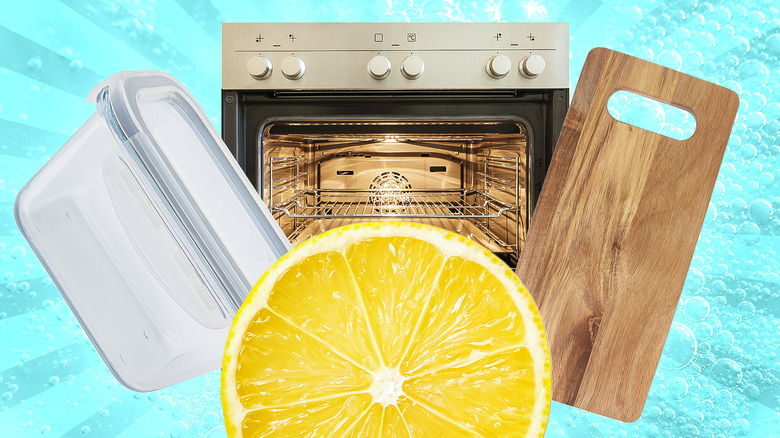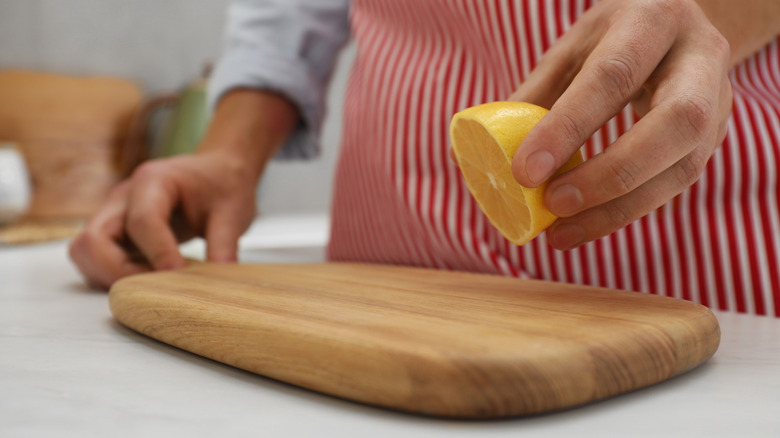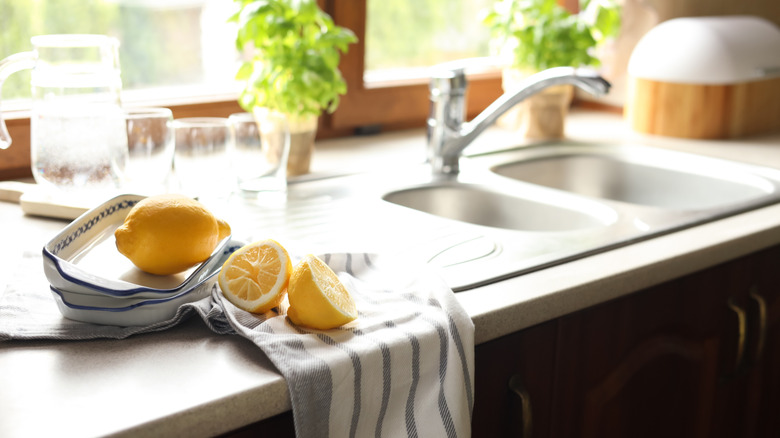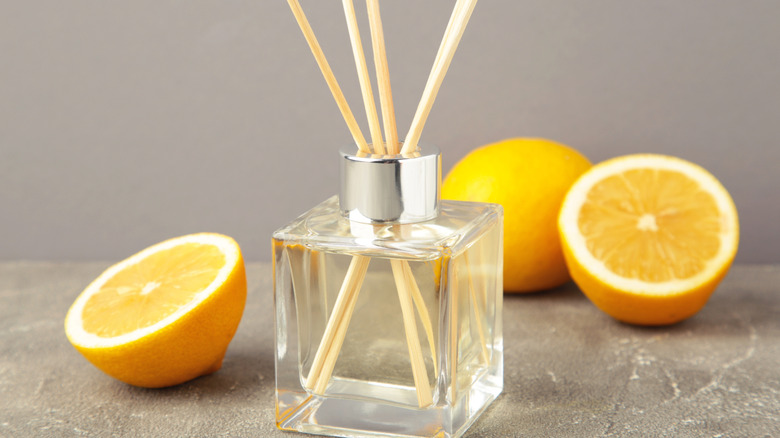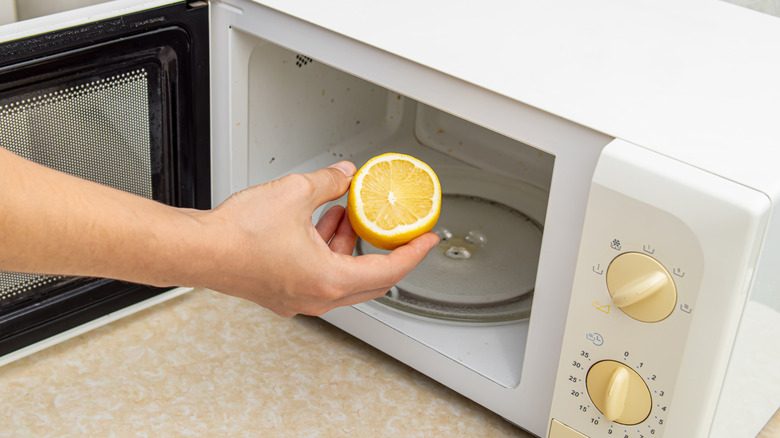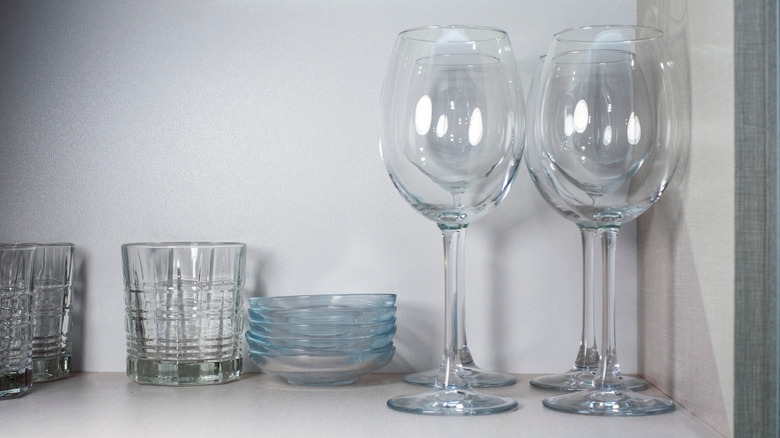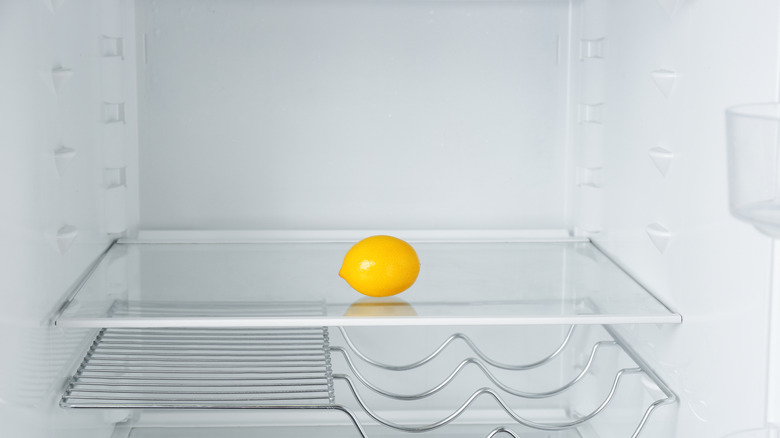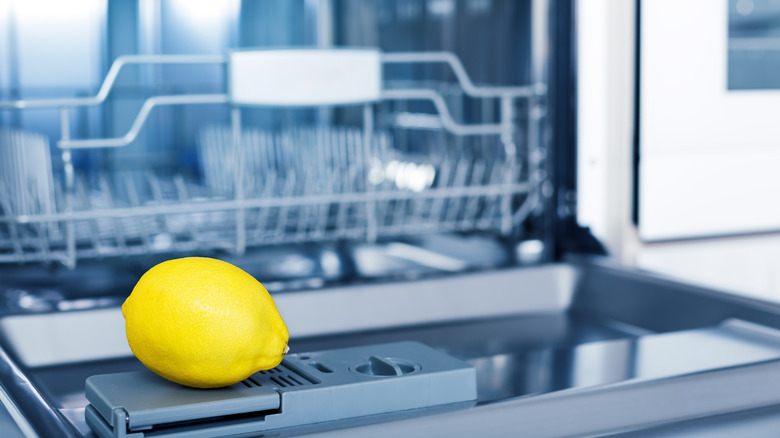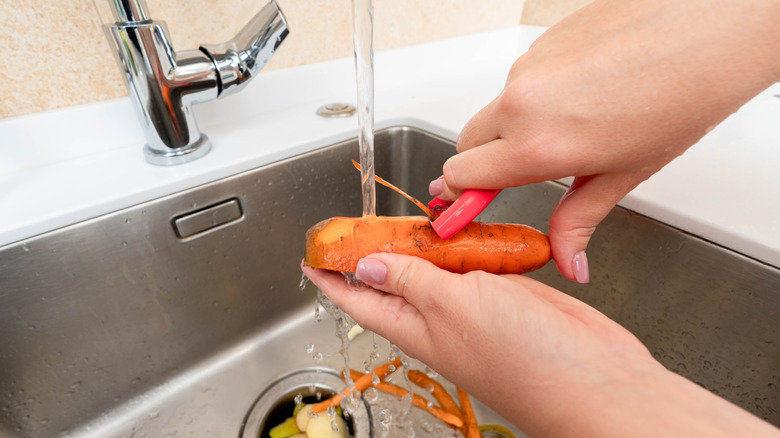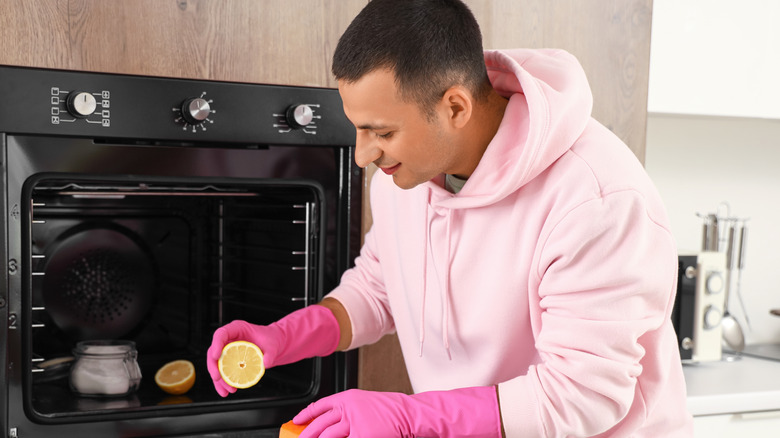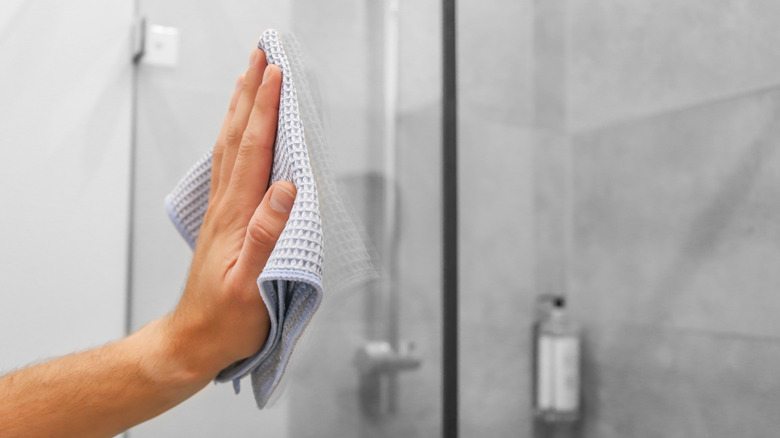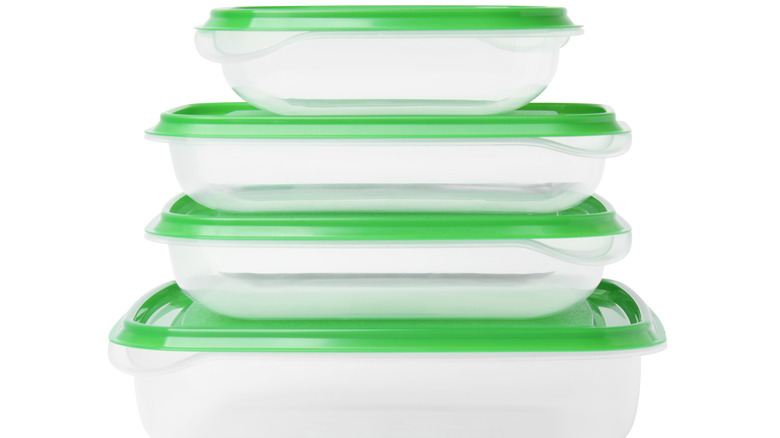11 Genius Lemon Hacks To Naturally Clean Your Kitchen
If you have a bunch of lemons in your fridge, you could of course make a batch of delicious lemonade — or you could get ahead on your cleaning tasks and use them to make your kitchen, and the rest of your house, sparkle like you wish it would. As versatile as this citrus fruit is to cook with, it is just as handy at cleaning up the mess afterward. Many of us are moving away from harsh cleaning products towards more natural solutions, and lemons are a key element in doing so.
Whether you want to make your sink sparkle or remove the streaks from your glass doors, lemons are there to make the job a lot simpler. For some tasks, you can even put used lemons to work, meaning that you are getting even more out of your food waste. So grab your hand juicer and let's have a look at 11 of the best ways to use lemons to help clean your home.
Clean your cutting board
Choosing the best cutting board for your kitchen can be a tricky choice. Plastic, wood, glass, marble — there are so many materials and colors from which to choose. Wood is one of the most popular options, as its neutral color matches most kitchens and it doesn't scratch as easily as plastic. Keeping a wooden cutting board clean and stain-free can be a challenge though, especially if you are preparing foods with deep colors such as strawberries or beets.
Hot soapy water is the best way to keep your wooden cutting board clean day-to-day, but if you have a stubborn stain that needs removing, lemon juice will come to your rescue. To clean up your board, simply sprinkle salt across it, then rub half a lemon over the top. Leave the mixture on the board for around five minutes, then clean it with a damp cloth. The great thing about this hack is that you can do it with an already-used lemon, so it's a great task to do at the end of the day when you've been cooking with lemons.
In addition to making your board look better, lemon juice has antibacterial properties, meaning you can be reassured that it is sanitizing your board at the same time. The fragrant scent will also tackle any stubborn smells that have been hanging about after preparing garlic or onions, meaning lemon juice is an overall wonderful option for keeping your cutting board in check.
Make your sink sparkle
Cleaning the kitchen is a daily chore that many of us dread, and with a big emphasis on the countertops, the sink can often be neglected. Stains and gunk build up quickly, leaving your sink looking less than perfect. Thankfully, with the help of a wedge of lemon, you can make easy work of sorting out your sink, and have it sparkling in minutes.
Taking inspiration from this Tik Tok video, you can clean your sink using a lemon half instead of a sponge. Starting by adding a drop of dish soap directly into the sink, then use the lemon as you would usually use your sponge. You will quickly see the grime and grease dislodge from the surfaces and make its way towards the plughole. If you make this part of your regular cleaning routine, your sink will easily sparkle after a quick once over with the lemon, leaving you time to work on other areas of the kitchen, or put your feet up with a cuppa.
You can use the same tip on your faucets, meaning that all the stainless steel sections of your kitchen are easy to keep clean. Don't use lemon juice on porous surfaces such as marble and granite though, as it can etch it and damage the surface.
Make a natural air freshener
One of the great reasons to use lemons to clean your home rather than chemical cleaners is the lovely fragrance they give off. They leave your kitchen smelling naturally fresh, rather than some of the more powerful commercial sprays available, which can leave an off-putting scent.
The best way to take advantage of this is to turn your lemons into a fragrant natural air freshener. This way, you can fill your kitchen, or any other room in the house, with the beautiful scent of lemon whenever you want. The simplest way to do this is to simmer a pan full of water on the stove, with some grated lemon peel and a couple of tablespoons of lemon juice. Add a teaspoon of baking soda and a few leaves of fresh lemon balm if you can get a hold of some.
Once you have created your natural air freshener, add it to a spray bottle and use it to freshen the kitchen after cleaning or other rooms throughout the house. You can even add a couple of drops of your favorite essential oils to give it a slightly different scent each time.
Degreases the microwave
If you've put food in the microwave without a cover on top, you will know how frustrating it is to have to deal with the spattered grease that ends up all over the inside — especially if it is a homemade tomato soup or anything particularly oily. Even if you are always careful about covering your food, dirt and sludge are still going to build up over time, and need a good scrub to restore the microwave to its sparkling glory.
The good news is that you can make this task much easier with the help of a trusty lemon, which can help to soften the grease and make it easier to clean. All you need for this miracle helping hand is a microwaveable bowl, a lemon, and a sponge. Juice the lemon and add it to around half a cup of water in the bowl, then add the squeezed lemon halves into the bowl. Turn the microwave on for around three minutes, during which time it will produce lemon-infused steam that will get to work without you having to lift a finger.
The citric acid found in the lemons has antibacterial properties which will help get your microwave truly clean and keep it that way. Once the cooking time finishes, leave the bowl inside for a while as it will continue to work its magic for a little longer. Once you finally open the door and give the inside of the microwave a wipe with the sponge, you will be delighted with how easily you can remove the dirt.
Get streak-free glassware
Lining up your freshly washed glasses in the cupboard can be a well-deserved reward as you work hard at cleaning the kitchen, but the joy can be cut short when you see unsightly streaks running across them. Whether you use a dishwasher or clean them by hand, fingerprints and smudges can still make their way onto your glasses and spoil that freshly washed look.
If you have a dinner party or event coming up where you need your glassware to really sparkle, a little lemon can come to your aid. Rub a cut piece of lemon onto the glass to allow the citric acid to break down any residue and leave your glasses sparkling. Alternatively, you can add some lemon juice to a bowl of water and place the glasses in, leaving them for five minutes for the mixture to do its work. In both cases, you will beautifully sparkling glassware to impress your guests, with only the faint smell of citrus left behind.
Freshen the fridge
An important part of maintaining a clean kitchen is keeping the refrigerator clean and tidy. But in our busy lives, it can be easy to forget about this important task, meaning that spillages don't get mopped up and funky odors can start to build up. If your fridge is smelling less than fresh, it may be time to tackle the job — armed with a trusty lemon.
For best results, empty the refrigerator entirely, which will give you the chance to throw away any expired produce or food that is past its best. Then squeeze some fresh lemon juice onto your cloth before using it to wipe down every surface of the fridge. The citric acid will help to break down grease and the citrusy aroma will leave a pleasant scent behind. Once the fridge is completely clean, return all of your food to the shelves, then cut up a lemon into slices and place them on a plate at the back of the fridge. This will help to keep your newly cleaned fridge smelling fresh for days, and you can replace the lemons periodically to keep this effect going if you wish.
Add to the dishwasher
If you have been making a recipe that uses lots of lemons — such as a lemon pie or a batch of lemonade — don't throw the used lemons in the bin just yet. You can get a bit more life out of them and cut down on your time spent cleaning at the same time by chucking them in the dishwasher.
As the dishwasher cycle runs, it will be able to extract some lemon juice even from used lemons, which will then help to break down some of the grease and dirt on your dishes. If you are often frustrated by the way your plates and glasses come out of the washer, trying this hack may result in clean crockery that is more to your liking.
The best place to put the lemon is in the cutlery rack, or secure it in the top shelf on a plate wire, to ensure it doesn't dislodge and end up clogging the filter. Not only will this little trick get even more out of your used lemons and leave your dishes sparkling, but if you do it regularly it will keep your dishwasher much cleaner and smelling fresh.
Clean up the garbage disposal
Garbage disposal units are a handy tool that can prevent your pipes from getting blocked with leftover food that makes its way down the plughole. However, like everything else in your kitchen, they can get bunged up with gunk and leftovers if they aren't maintained properly. If you are starting to notice a funky smell emanating from your sink, it is probably time to clean the garbage disposal.
An effective and safe way to look after your garbage disposal without risking any fingertips is to keep it clean using lemons. This is most effective if you start while the waste disposal is new or recently cleaned, as this method can prevent sludge from building up. Simply cut a fresh lemon into wedges and add to the disposal unit individually, waiting until each one has been churned up before adding the next. You will hear the blades complaining as they chop up the tough lemon peel, but rest assured they are getting a great polish from the lemon as they work so hard. Once you have done this to clean up your disposal unit, every time you are using lemon in your recipes, be sure to add it to the waste disposal and freshen up those gears.
Make cleaning the oven a bit easier
Cleaning the oven — what a horrible task. It's a job many homeowners dread, and while we always say that next time we will clean it regularly to make it easier, it never quite works out that way. By using lemons to do some of the work for you, though, you can maintain your oven regularly, preventing having to spend a whole day scrubbing every few months.
Like some of the other tips on this list, it involves creating lemony steam that will circulate in the oven while you sit down and relax. Find an oven-proof dish and add water and the juice of two lemons. Turn the oven on to around 250 degrees Fahrenheit for about 20 minutes, leaving the dish in for a further 20 minutes after you have turned it off.
You can then use the hot lemon water to wipe down the sides of the oven with a cloth, which will be much easier since the acid in the lemons will have started to break it down for you. If you do this regularly, it will become easier each time, and cleaning the oven should go from being one of the most hated jobs in the house to a simple maintenance task that doesn't take too much effort.
Make a homemade glass cleaner
Is there anything more disheartening when cleaning the house than spending an age working on windows and glass doors, only to stand back and see unsightly streaks across them? With help from lemons and another acidic pantry staple, you can say goodbye to streaky windows and preserve your sanity too!
Add one part white vinegar to two parts lemon juice and dilute with warm water, then transfer to a spray bottle. You will then have a completely natural glass spray cleaner that is antibacterial and will leave your doors and windows gleaming. You can also use it on glass shelves in your fridge or freezer, meaning you don't need to use harsh chemicals on surfaces that your food will touch.
To make this homemade solution even more economical, make up some of this solution whenever you have lemons that you have partially used for cooking. Rather than leaving the other half to languish at the back of the fridge, you can squeeze it into your spray bottle and put it to use the following day, then stand back and gaze in pride at your streak-free windows.
Restore your plastic containers
If you're a keen meal prepper or like to store leftovers neatly in the fridge or freezer, chances are you have plenty of plastic tubs. As practical as they can be, after a number of uses, they can end up with unsightly stains on plastic storage containers and unpleasant odors that washing alone won't remove; any type of tomato sauce is a particularly big culprit. With help from some lemon though, you can restore your plastic containers to their former glory.
To freshen up your container, start by cutting a lemon in half, and then squeezing some of the juice into the plastic tub. Then rub the lemon half across the container, paying particular attention to the stained spots. Once you have rubbed the entire surface of the container, leave it with the lemon juice in it to dry. Then give it a quick wipe, and the stain should be gone. It will also smell much freshener than it did before, thanks to the fragrant citrus scent.
